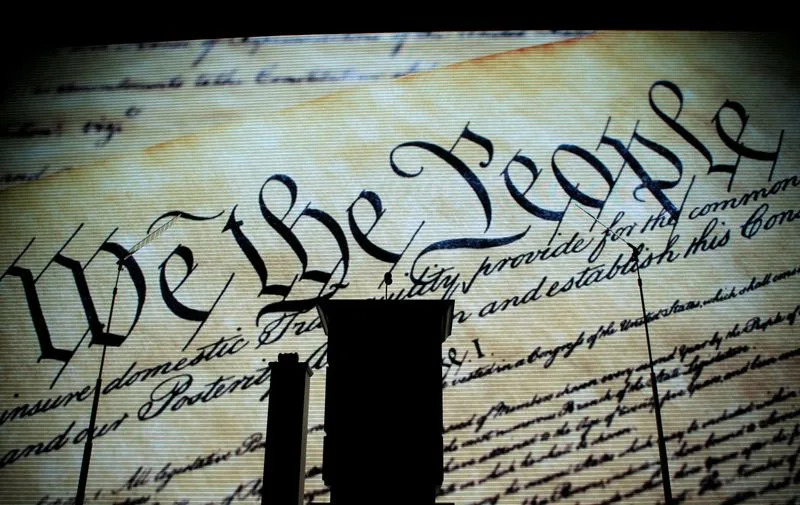https://www.yahoo.com/news/explainer-could-biden-avert-debt-101330230.html
Explainer-Could Biden avert a debt default by using the 14th Amendment?
Andy Sullivan and Jacqueline Thomsen
Tue, May 2, 2023 at 6:13 AM EDT·3 min read

WASHINGTON (Reuters) - The divided U.S. Congress is running out of time to raise the federal government's $31.4 trillion debt ceiling, with the Treasury Department warning it could be unable to pay its bills as soon as June 1.
If Congress fails to act, some legal experts say Democratic President Joe Biden has another option to avert a crisis: Invoke the 14th Amendment to the U.S. Constitution to ensure the United States can continue to pay its bills.
WHAT IS THE 14TH AMENDMENT?
Section Four of 14th Amendment, adopted after the 1861-1865 Civil War, states that the "validity of the public debt of the United States ... shall not be questioned."
Historians say that aimed to ensure the federal government would not repudiate its debts, as some former Confederate states had done.
But the clause has been largely unaddressed by the courts, and legal experts disagree about what it requires from Congress and the presidency.
Some, like Cornell University law professor Michael Dorf, say the "least unconstitutional" option would be for Biden to act on his own to protect the integrity of the national debt.
"That would mean borrowing money," he said.
Any action by Biden would surely prompt a lawsuit.
WHO COULD SUE OVER THE DEBT CEILING?
It's not clear who could bring a case. It could be difficult for any plaintiff to prove they had been harmed by the action — a legal concept known as "standing."
The U.S. Supreme Court ruled in 1997 that individual lawmakers do not have standing to file such lawsuits, but Congress could potentially vote to say that it had been collectively harmed.
The high court could also opt to hear a challenge in the interest of quickly resolving the issue, as they have done with Biden's move to cancel $430 billion in student debt.
Any case would be in uncharted legal territory.
The Supreme Court has ruled on the public-debt clause only once, in a 1935 challenge to Democratic President Franklin Roosevelt's decision to take the United States off the gold standard. The court ruled that the plaintiff, a bondholder, did not have standing to file the case.
Explainer-Could Biden avert a debt default by using the 14th Amendment?
Andy Sullivan and Jacqueline Thomsen
Tue, May 2, 2023 at 6:13 AM EDT·3 min read
WASHINGTON (Reuters) - The divided U.S. Congress is running out of time to raise the federal government's $31.4 trillion debt ceiling, with the Treasury Department warning it could be unable to pay its bills as soon as June 1.
If Congress fails to act, some legal experts say Democratic President Joe Biden has another option to avert a crisis: Invoke the 14th Amendment to the U.S. Constitution to ensure the United States can continue to pay its bills.
WHAT IS THE 14TH AMENDMENT?
Section Four of 14th Amendment, adopted after the 1861-1865 Civil War, states that the "validity of the public debt of the United States ... shall not be questioned."
Historians say that aimed to ensure the federal government would not repudiate its debts, as some former Confederate states had done.
But the clause has been largely unaddressed by the courts, and legal experts disagree about what it requires from Congress and the presidency.
Some, like Cornell University law professor Michael Dorf, say the "least unconstitutional" option would be for Biden to act on his own to protect the integrity of the national debt.
"That would mean borrowing money," he said.
Any action by Biden would surely prompt a lawsuit.
WHO COULD SUE OVER THE DEBT CEILING?
It's not clear who could bring a case. It could be difficult for any plaintiff to prove they had been harmed by the action — a legal concept known as "standing."
The U.S. Supreme Court ruled in 1997 that individual lawmakers do not have standing to file such lawsuits, but Congress could potentially vote to say that it had been collectively harmed.
The high court could also opt to hear a challenge in the interest of quickly resolving the issue, as they have done with Biden's move to cancel $430 billion in student debt.
Any case would be in uncharted legal territory.
The Supreme Court has ruled on the public-debt clause only once, in a 1935 challenge to Democratic President Franklin Roosevelt's decision to take the United States off the gold standard. The court ruled that the plaintiff, a bondholder, did not have standing to file the case.